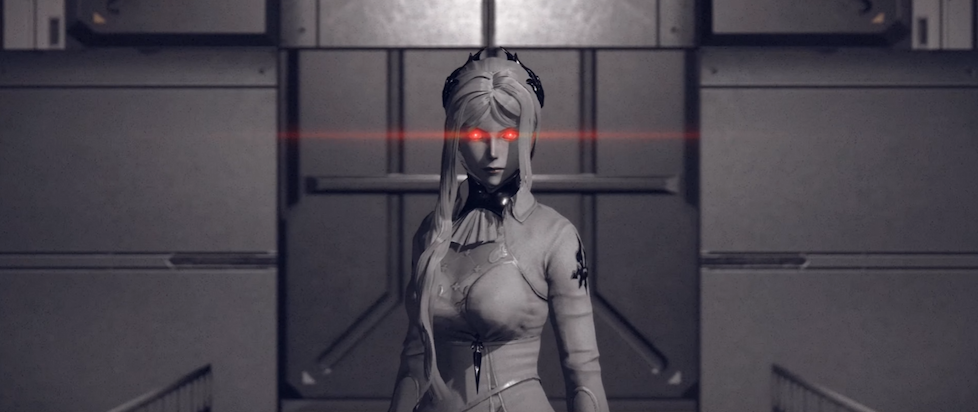
The Esoteric Nihilism of YoRHa
Commander White says to 9S, “We need a god worth dying for.” But what is god to the androids? Humanity, made in god’s image, thus the androids, being made in man’s image, a copy of a copy, a simulacrum. But God, the Abrahamic god, the god of the Bible, is never really spoken of in NieR: Automata, just in oblique references. Something always present but never there.
It’s a bit like Leo Strauss. The right wing is always haunted by him, always mimicking him, yet it’s rare to hear his name spoken. To talk about Straussianism is not always to talk about Strauss, but any discussion of neoconservatism is incomplete without Strauss. And as I dwell on it, I’m starting to think that any discussion of YoRHa is incomplete without Strauss, too.
Leo Strauss was a very careful reader, probably too careful. Strauss saw the surface level of a text, what the words say and what they mean, and then asked what carefully laid meaning lies just beneath that. And so, what’s underneath that? Nothing. The history of Western philosophy, under a certain Straussian reading, is a long lurch towards the undeniable fact that nothing means anything. But this revelation is so shattering, so earthshaking, that were it public knowledge, society would crumble as it loses all moorings. Normal people can’t handle it, apparently. This nihilism is hidden, then, in the hallowed texts of the Western intellectual tradition, for only the eyes of a wizened reader to uncover. Scholar Jim George calls this “esoteric nihilism”, and he believes this to be the underpinning ideology of neoconservative foreign policy. And it’s also exactly what YoRHa is doing.
When you play through Automata, the shoes just keep dropping. 9S and 2B’s mission is a layer cake of elaborate lies. YoRHa is known to the androids as an agency dedicated to enacting the will of what’s left of humanity, but it gradually unravels in front of us, and it reveals a void at the center: the humans are dead. The central mission of YoRHa is a lie. When 9S discovers the truth (at least, the first of many esoteric truths), that’s when Commander White says that line: “We need a god worth dying for.” It’s a noble lie, harkening to Plato, to Strauss. The purpose of this conspiracy is to keep the androids alive, fighting for something. In a twist of fate, it’s the humans who are saving the androids, even from beyond the grave.
But Commander White isn’t being metaphorical when she says “dying”. This is war we’re talking about. YoRHa wages an endless, unjustified war with the machines, exclusively to maintain a sense of purpose for the androids. In this way, YoRHa is not just Straussian, but superlatively neoconservative. This is precisely what Jim George describes with derision when he highlights Straussianism in the so-called Bush Doctrine: the war culture maintains unity. War gives life meaning. War creates a national identity. War keeps society alive. It doesn’t matter if the war is just, because all war is justified by the continued identity of those who fight them. So what if there were no WMDs in Iraq? If the aliens are dead? If the Red Scare was a mirage? If the humans are gone? It never mattered.

But of course, it matters a lot. That’s the contradiction. The architects of YoRHa, whoever they were, wanted to make sure that when all was said and done, there was no trace of the lie. The entire operation has to destroy itself like a tape from Mission: Impossible. In our world, certain conservative figureheads unconvincingly espouse the importance of religion while denying its validity. While Strauss had envisioned a heritage of philosopher-kings, shepherding secret wisdom throughout the generations, YoRHa is a little more severe. The esoteric knowledge has to be annihilated, not just hidden. It’s why 2B repeatedly executes 9S, and why every single YoRHa android has to die. Esoteric nihilism as an institution must refute its own truth continually in order to maintain itself.
YoRHa and the esoteric nihilists don’t believe in god, but they do believe in religion. Because the truth isn’t only shocking, it’s also just plain disappointing. Learning the truth robs believers of purpose, pulls the rug out from under them. 9S loses control, even with Commander White’s assurances. Decades into a forever war in the Middle East, the US right wing has grown restless under its secular establishment and longed for the radical reactionaries at the fringe to wrest control of the beast. “The masses need their opium.” Believing you need a god worth dying for is not that different from believing in that god in the first place. Even the nihilists yearn for the god they killed.
Meanwhile, YoRHa’s house of cards collapses, not quite as it was intended to, but smothering its secret history nonetheless. But in the final, final epilogue, we see the Pods prepare to begin again. But begin what again?
When you see so many innocent people die in the name of nothing, it’s hard to walk away from NieR: Automata thinking that YoRHa’s noble lie was all that noble. But there’s something sort of uneasy about Automata’s takedown. See, there’s that constant Hegelian bent here, in this cycle of violence. Any difference is a difference that must be eradicated. They just won’t stop fighting. Even a machine consciousness near the end of the game, forged in the network, fully aware of the truth about humanity, turns on itself and crumbles. The stability that war provides the androids is an illusion, yet war is still stable. Automata tries to peel away the esoteric lies, but when the abyss at the center is uncovered, when the endless conflict is revealed to be founded on nothing at all, it still cannot imagine a world without war. Maybe we never needed a reason to begin with.
———
Reference:
George, J. Leo Strauss, Neoconservatism and US Foreign Policy: Esoteric Nihilism and the Bush Doctrine. Int Polit 42, 174–202 (2005). https://doi.org/10.1057/palgrave.ip.8800106
———
vehemently is a pseudonymous writer in the Pacific Northwest, writing on games, culture, and philosophy.





